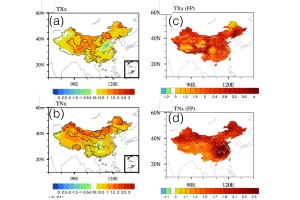China faces substantially hotter summers and winters by 2050
12 February 2021

Temperatures in China may increase dramatically within the next three decades as the country begins to feel the effects of global greenhouse gas emissions, new research has shown.
Scientists at the University of Reading and Chinese Academy of Sciences studied how much and why temperatures will rise in mainland China under the ‘intermediate’ IPCC scenario, in which carbon emissions peak around 2040 before declining.
Their forecasts, published in Climate Dynamics, show temperature highs and lows will rise by around 2°C for both days and nights in summer and winter by 2050. This warming is also predicted to be more dramatic than that seen in recent decades, with efforts to reduce air pollution exposing China to more heat from the Sun.
Dr Buwen Dong, a climate scientist at the University of Reading and NCAS, and co author of the research, said: “When making global warming predictions, we often look ahead to the end of the century, but this research shows China could be experiencing dramatic temperature rise sooner than we thought.”
“We found that reducing air pollution in China will also make the already unavoidable impacts of climate change more apparent there in the short term. However, this should not put us off from taking this important step, which will have huge long-term benefits.”
“The short-lived consequences of lowering emissions will be felt in China at whatever point it cleans up its air, but the longer it takes to do this, the more average temperatures will have been driven up by climate change and the worse things will be.”
More hot days and nights, less ice and frost
Rather than look at projected changes to temperature under climate change several decades in the future like most previous studies, the researchers focused on expected changes in the first half of the 21st century.
Their forecast method was retrospectively applied to China’s temperatures between 1961-2010 and were found to be accurate, giving confidence in their predictions for the future.
The predictions included:
- The hottest daytime temperature will rise by 2.4°C and the hottest night by 1.8°C across China – an increase five times bigger than the observed year-to-year variations in temperature compared to the mean average between 1961-2010.
- Minimum temperatures will increase by 2.1°C in the day and 2.3°C at night over China – more than double the year-to-year variability seen in observations.
- Temperature rise will vary across different regions. South East China was forecast to see the biggest increase, with maximum temperatures increasing by 3.2°C in the day and 2.1°C at night.
- There will be 8 more summer days (when the daily maximum temperature exceeds 25oC) and 11 more tropical nights (when the night time temperature does not drop below 20°C) across China.
- There will be 6 fewer ice days and 4 fewer frost days every year across China.
The team also looked at the reasons why these changes would occur. The warmer temperature extremes were shown to be mainly due to an increase in China’s average temperature due to climate change.
Short-term temperature increases were also attributed to reduced air pollution particles expected due to cleaner air targets. This is likely to mean clearer skies and less reflective clouds, allowing more sunlight to reach the land surface as less will be absorbed or reflected away.
There is also likely to be more water vapour in the air due to the hotter climate, which itself will drive up temperatures.
Climate change impact on China extreme weather events
In two separate recent studies co-authored by Dr Dong and published in a special supplement to the Bulletin of the American Meteorological Society journal, the influence of human-caused climate change on two notable extreme weather events in China in 2019 was assessed.
The researchers looked at a record-breaking extreme period of wet weather over the middle and lower part of the Yangtze River, which saw more than 50 rainy days between December 2018 and February 2019 and the region’s lowest daily sunshine hours average since 1961. It was defined as one of the country’s top 10 extreme weather and climate events for 2019 by the China Meteorological Administration.
The study found that climate change in fact reduced the probability of this amount of rainfall occurring by 19%, meaning natural weather variability was instead the main cause of this unprecedented event.
The second study looked at the extremely dry period in southwestern China between May and June 2019. The region saw the lowest amount of rainfall since 1960, drying out hundreds of rivers and reservoirs, affecting 640,100 hectares of crops in Yunnan and western Sichuan, and resulting in an economic loss of 2.81bn Chinese Yuan ($400m).
Extremely dry conditions in southwestern China like those in 2019 were found to be six times more likely under human-caused climate change, indicating a direct link with this dry event.
Image caption: (Top) Change in maximum daytime temperature from past (1964-1981) to present (1994-2011), and (bottom) from present to future (2045-2055)

